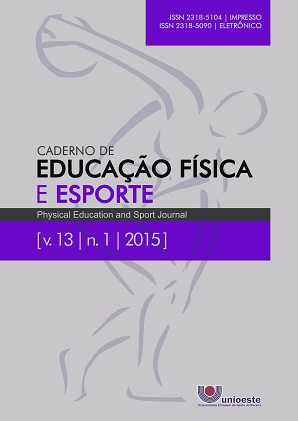MOOD STATES AND PERFORMANCE: AN ANALYSIS BY THE CATASTROPHE THEORY FRAMEWORK
DOI:
https://doi.org/10.36453/2318-5104.2015.v13.n1.p51Keywords:
Humor, Desempenho Esportivo, Teoria da CatástrofeAbstract
This study sought to examine the mood and anxiety as factors influencing sports performance of athletes participating in Futsal Finals Youth Games of Parana in 2011. The sample consisted of 11 male athletes from team Campo Mourão, aged between 16 and 18 years. The instruments used to assess the mood was the Brazilian Mood Scale (BRAMS) validated by Rohlfs et al (2006), since anxiety was analyzed using the Competitive State Anxiety Inventory (CSAI-2), which are applied before and after each match. For data analysis was used for qualitative and descriptive statistics. The results allowed to conclude that the change in mood of athletes during the competition can be considered a factor that contributed to the defeat in the semifinal match, and the extent to which anger can be varied more crucial in the perception of athletes and their ability to win, since the same self-confidence also fell throughout the competition. It is concluded that for this team, the size of humor and anger characteristic of self-confidence may have been high points in the defeat of team in a match considered important.
Downloads
References
BRANDT, R.; VIANA, M. S.; SEGATO, L.; KRETZER, F. L.; CARVALHO, T.; ANDRADE, A. Relações entre os estados de humor e o desempenho esportivo de velejadores de alto nível. Psicologia: Teoria e Prática, Goiania, v. 13, n. 1, p. 117-30, 2011.
CRUZ, J. F. Stress, ansiedade e competências psicológicas em atletas de elite e de alta competição: relação com o sucesso desportivo. In: CRUZ, J.; GOMES, A. R. (Orgs.) Psicologia Aplicada ao Desporto e à Actividade Física: teoria, investigação e intervenção. Braga: Universidade do Minho e Associação dos Psicólogos Portugueses, 1997. p. 111-40.
DE ROSE JUNIOR, D.; VASCONCELLOS, E. G. Ansiedade-traço competitiva e atletismo: um estudo com atletas infanto-juvenis. Revista Paulista de Educação Física, São Paulo, v. 11, n. 2, p. 148-54, 1997.
EDWARDS, T.; KINGSTON, K.; HARDY, L.; GOULD, D. A qualitative analysis of catastrophic performances and the associated thoughts, feelings, and emotions. The Sport Psychologist, Champaign, v. 16, n. 1, p. 1-19, 2002.
EUBANK, M.; COLLINS, D. Coping with pre- and in-event fluctuations in competitive state anxiety: a longitudinal approach. Journal of Sports Sciences, Leeds, v. 18, n. 2, p. 121-31, 2000.
FLAY, B. R. Catastrophe Theory in social psychology: some applications to attitudes and social behavior. Behavioral Science, Basel, v. 23, n. 5, p. 335-50, 1978.
GAZZANIGA, M. S.; HEATHERTON, T. F. Ciência psicológica: mente, cérebro e comportamento. Porto Alegre: Artmed, 2005.
GOULD, D.; KRANE, V. The arousal-athletic performance relationship: current status and future directions. In: HORN, T. S. (Org.) Advances in sport psychology. Champaign: Human Kinetics, 1992, p. 119-41.
HAGTVET, K. A.; HANIN, Y. L. Consistency of performance‑related emotions in elite athletes: generalizability theory applied to the IZOF model. Psychology of Sport and Exercise, Melbourne, v. 8, n. 1, p. 47‑71, 2007.
HARDY, L. A catastrophe model of performance in sport. In: JONES, J. G.; HARDY, L. (Eds.) Stress and performance in sport. New York: John Wiley & Sons, 1990. p. 81-106.
HARDY, L.; BEATTIE, S.; WIIDNAB, T. Anxiety-induced performance catastrophes: Investigating effort required as an asymmetry factor. The British Psychological Society, Malden, v. 98, n. 1, p. 15-31, 2007.
HARDY, L.; JONES, G.; GOULD, D. Understanding psychological preparation for sport: theory and practice of elite performers. New York: Wiley, 1996.
RAPOSO, J. V.; LÁZARO, J. P.; COELHO, E. Documento de apoio à disciplina de psicologia do desporto no curso de educação física e desporto. Vila Real: DATAFES, 2006.
ROHLFS, I. C. P. M.; CARVALHO, T.; ROTTA, T. M.; KREBS, R. J. Aplicação de instrumentos de avaliação de estados de humor na detecção da síndrome do excesso de treinamento. Revista Brasileira de Medicina de Esporte, São Paulo, v. 10, n. 2, p. 111-6, mar/abr, 2004.
THOMAS, J.; NELSON, J.; SILVERMAN, S. Métodos de pesquisa em atividade física. 5 ed. Porto Alegre: Artmed, 2008.
VIANA, M. F.; ALMEIDA, P. L.; SANTOS, R. C. Adaptação portuguesa da versão reduzida do Perfil de Estados de Humor-POMS. Análise Psicológica, Lisboa, v. 19, n. 1, p. 77-92, 2001.
WEINBERG, R. S.; GOULD, D. Fundamentos da psicologia do esporte e do exercício. Porto Alegre: Artmed, 2001.
ZEEMAN, E. C. Catastrophe theory. Scientific American, New York, v. 234, n. 4, p. 65-83, 1976.
Downloads
Published
How to Cite
Issue
Section
License

This work is licensed under a Creative Commons Attribution-NonCommercial-ShareAlike 4.0 International License.
Os direitos autorais permitem descarregar, compartilhar, copiar, distribuir, adaptar, transformar, exibir, reproduzir a totalidade ou partes do artigo para qualquer propósito legal, desde que não tenha fins lucrativos e seja citada a fonte.
Informamos que todo o conteúdo do texto publicado, e dos seus possíveis erros ortográficos e gramaticais, é de inteira responsabilidade de seus autores, não cabendo ao Caderno de Educação Física e Esporte, ou aos nossos Avaliadores Ad Hoc, por qualquer implicação legal ou por eventual negligência à língua portuguesa ou à estrangeira.



















